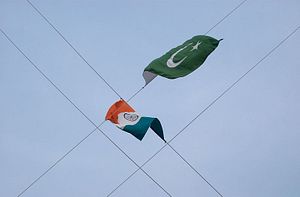As usual, a few curated links covering events across South Asia:
After a three week pause over an Indian drug bust, Pakistan agreed to resume cross-border trade across the Line of Control in Kashmir. In response to India seizing a Pakistani truck allegedly carrying $18.5 million in heroin, Pakistan shut down all cross-border trade in the disputed zone. The development came shortly after Indian and Pakistani trade ministers met in New Delhi to move forward with expanded trade ties. 27 trucks were cleared to enter India from Pakistan, and 49 trucks entered Pakistan from India.
Parliamentary procedure was put aside in favor of pepper spray in India’s Lok Sabha (lower house of parliament) following the introduction of a controversial bill that would carve the Indian state of Andhra Pradesh in two to create a separate state called Telangana. One member of parliament, L. Rajagopal from Andhra Pradesh, used pepper spray on his colleagues and has been expelled from participating in parliament for five consecutive sessions. According to the Economics Times, another parliamentarian allegedly brandished a knife over the issue. The Telangana issue has stirred controversy for some time with representatives from Andhra Pradesh. Proponents argue that a smaller administrative region would lead to better governance and that Telangana is a sufficiently differentiated region to warrant its own state government. Opponents are against splitting Andhra Pradesh. Under the current proposal, the city of Hyderabad would remain the joint capital of the two Indian states for the first 10 years.
The government of Afghanistan moved forward with additional prisoner releases despite strong and vocal U.S. opposition. On Thursday, 65 prisoners were released from Bagram prison and transported away by the Afghan National Army’s military police. The U.S. embassy released a statement calling the decision “deeply regrettable.” The embassy statement added that “The Afghan government bears responsibility for the results of its decision. We urge it to make every effort to ensure that those released do not commit new acts of violence and terror, and to immediately bring to justice any who do so.”
2014’s first green-on-blue attack took place on Thursday when two men in Afghan National Security force uniforms fatally shot two Coalition soldiers in Afghanistan’s Kapisa province. “Green-on-blue” is a term to describe attacks by uniformed Afghan security force individuals against ISAF forces and became a major issue in 2012 and 2013. The last such attack took place on October 26, 2013. According to The Long War Journal, the “long lull in attacks since October is due in large part to the ongoing drawdown in Coalition personnel, which has greatly reduced partnering with Afghan forces, as well as enhanced security measures such as the use of ‘guardian angels’ during joint operations.”
U.S. Ambassador to India Nancy Powell held a one-hour closed-door meeting with the opposition Bharatiya Janata Party’s prime ministerial candidate Narendra Modi on Thursday. According to a statement on Modi’s website, the two discussed almost every issue with exception of a U.S. visa for Modi. Modi was denied a U.S. visa in 2005 over his alleged role in the 2002 Gujarat riots where several hundred Muslims were killed. Modi has not been convicted of wrong-doing by any Indian court, but the fact that he was the chief minister of Gujarat at the time still leads many observers to associate him with the riots. In 2013, the U.S. Commission on International Religious Freedom (USCIRF) recommended that the U.S. continue its ban on Modi’s travel to the United States. Powell’s meeting with Modi represents a pragmatic streak in how the U.S. approaches the man who is mostly likely to end up on top following India’s upcoming general elections.
Also, in case you missed it, Nepal elected a new moderate prime minister and may finally be able to conclude a permanent constitution. I wrote on that in more detail here.

































